九年级全册 Unit 7-Unit 12 重点语法期末复习课件(共31张PPT)
文档属性
| 名称 | 九年级全册 Unit 7-Unit 12 重点语法期末复习课件(共31张PPT) | 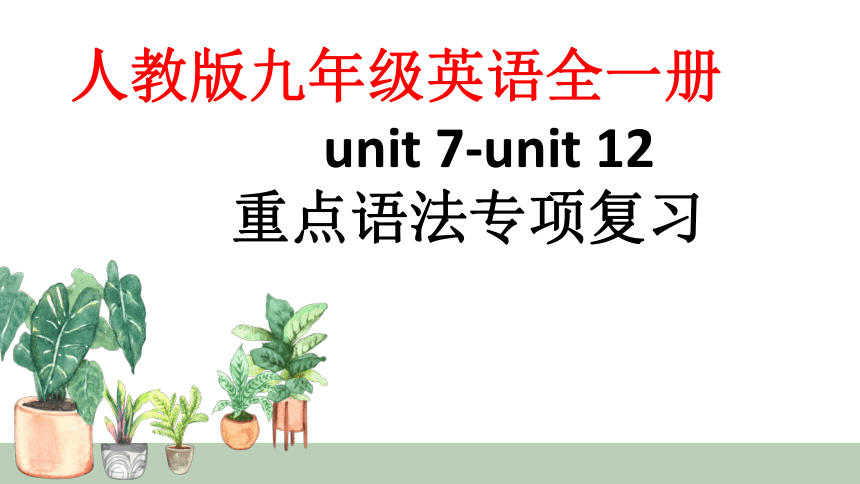 | |
| 格式 | pptx | ||
| 文件大小 | 22.3MB | ||
| 资源类型 | 教案 | ||
| 版本资源 | 人教新目标(Go for it)版 | ||
| 科目 | 英语 | ||
| 更新时间 | 2024-12-30 16:13:20 | ||
图片预览

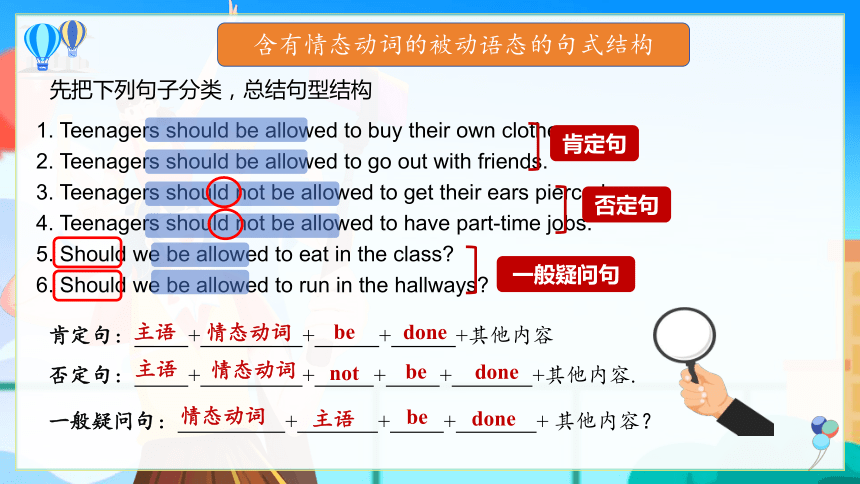
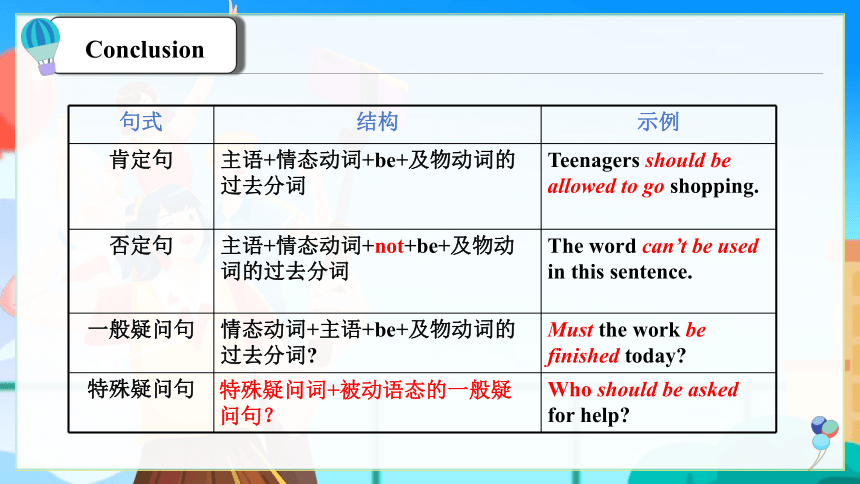
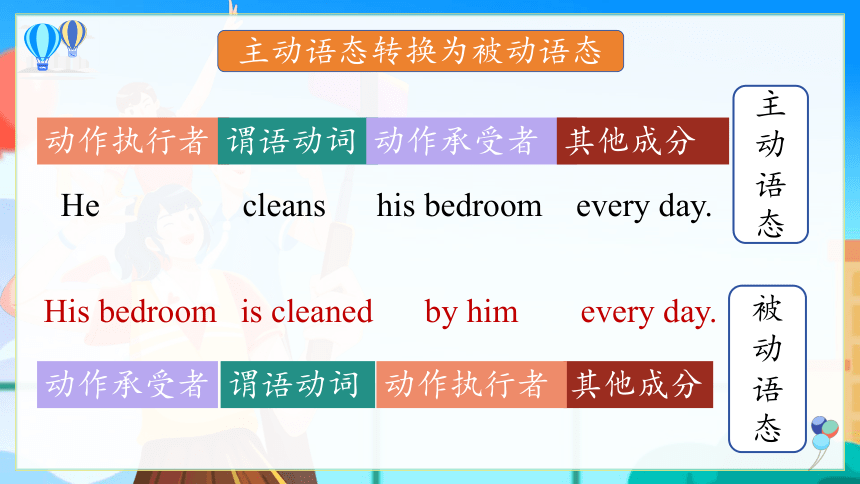
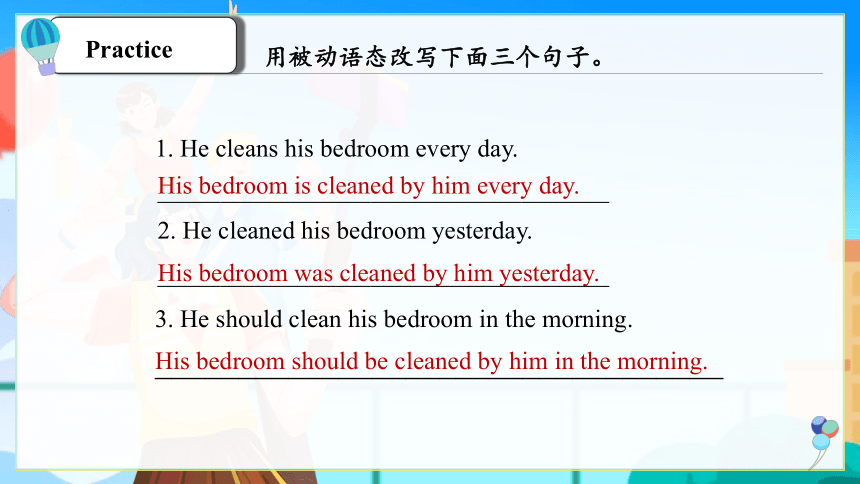
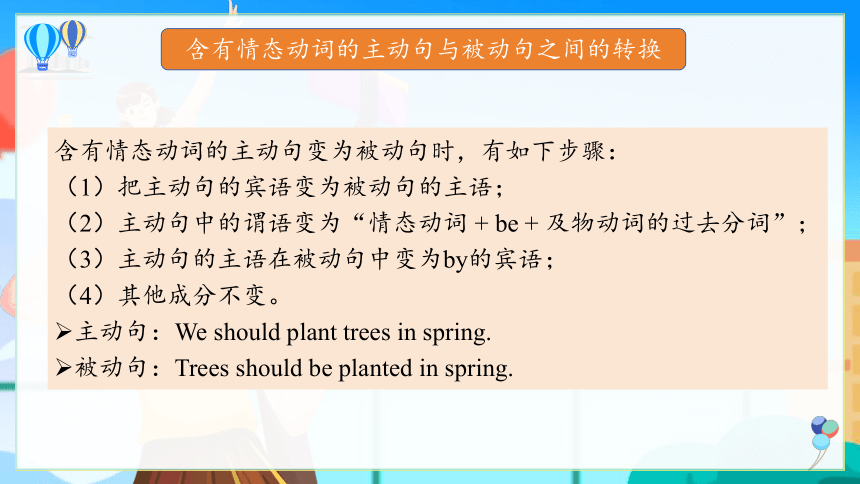
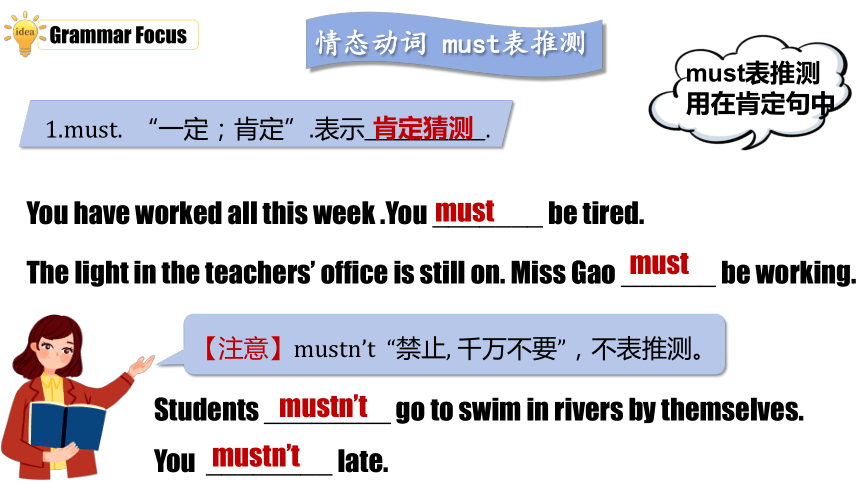
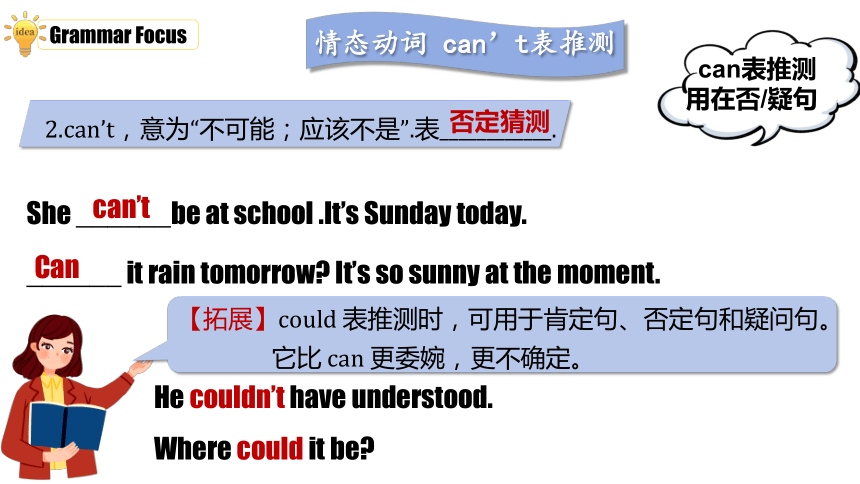
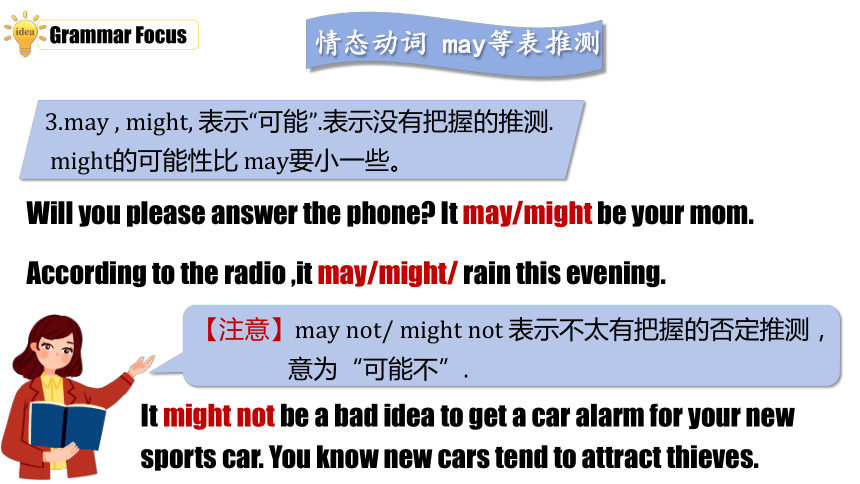
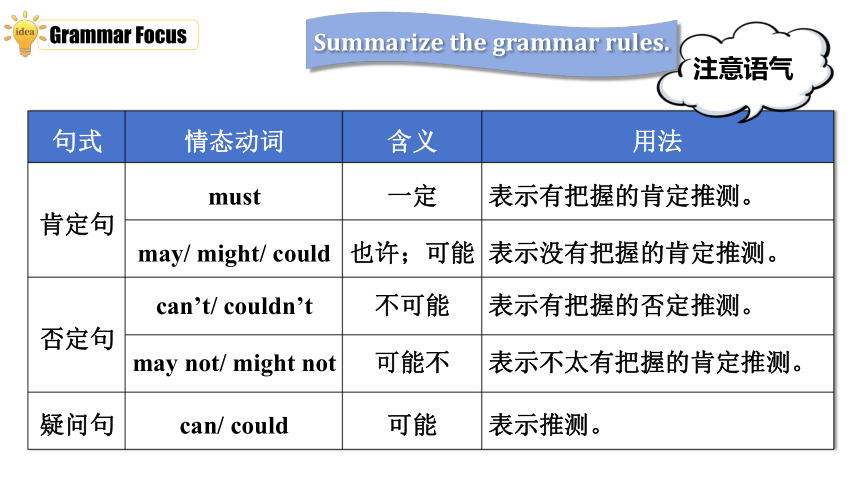
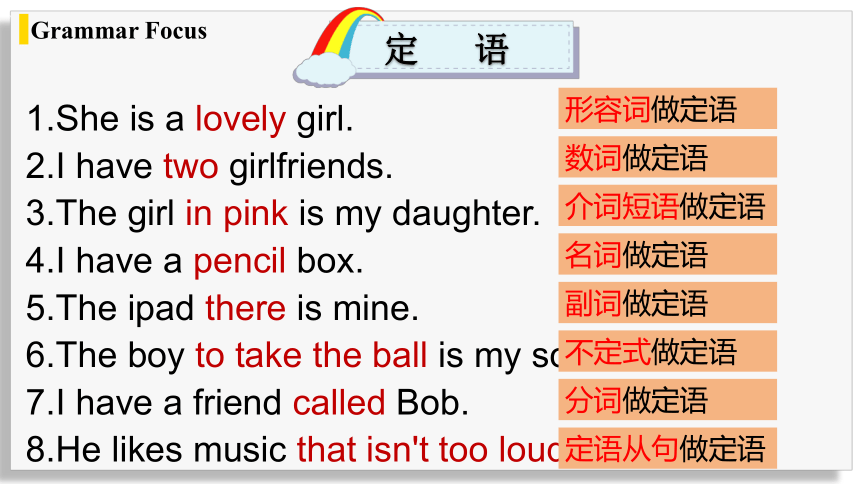
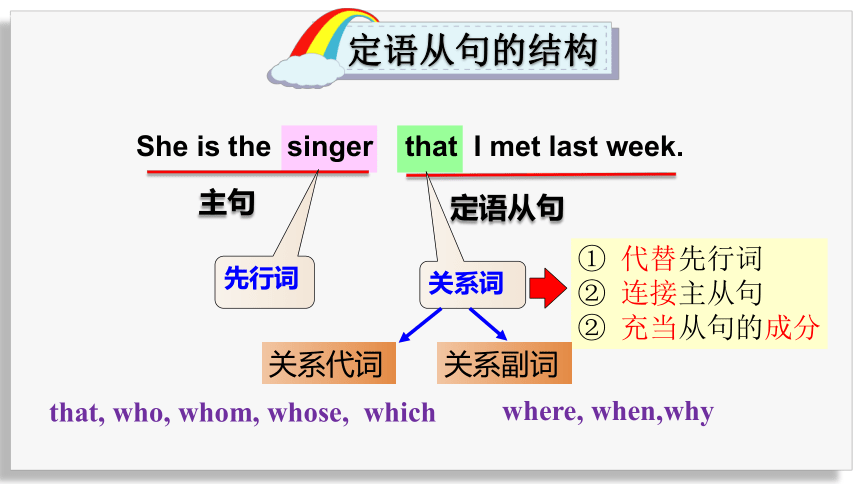
文档简介
(共31张PPT)
人教版九年级英语全一册
unit 7-unit 12
重点语法专项复习
含有情态动词的被动语态的句式结构
1. Teenagers should be allowed to buy their own clothes.
2. Teenagers should be allowed to go out with friends.
3. Teenagers should not be allowed to get their ears pierced.
4. Teenagers should not be allowed to have part-time jobs.
5. Should we be allowed to eat in the class
6. Should we be allowed to run in the hallways
先把下列句子分类,总结句型结构
肯定句: + + + +其他内容
否定句: + + + + +其他内容.
一般疑问句: + + + + 其他内容?
主语
情态动词
be
done
主语
情态动词
not
be
done
情态动词
主语
be
done
肯定句
否定句
一般疑问句
句式 结构 示例
肯定句 主语+情态动词+be+及物动词的过去分词 Teenagers should be allowed to go shopping.
否定句 主语+情态动词+not+be+及物动词的过去分词 The word can’t be used in this sentence.
一般疑问句 情态动词+主语+be+及物动词的过去分词 Must the work be finished today
特殊疑问句 Who should be asked for help
特殊疑问词+被动语态的一般疑问句?
Conclusion
He
cleans
his bedroom
every day.
His bedroom
is cleaned
by him
every day.
动作执行者
谓语动词
动作承受者
其他成分
其他成分
动作执行者
动作承受者
谓语动词
主动语态
被动语态
主动语态转换为被动语态
用被动语态改写下面三个句子。
1. He cleans his bedroom every day.
2. He cleaned his bedroom yesterday.
3. He should clean his bedroom in the morning.
His bedroom is cleaned by him every day.
His bedroom was cleaned by him yesterday.
His bedroom should be cleaned by him in the morning.
____________________________________
__________________________________
____________________________________
Practice
含有情态动词的主动句变为被动句时,有如下步骤:
(1)把主动句的宾语变为被动句的主语;
(2)主动句中的谓语变为“情态动词 + be + 及物动词的过去分词”;
(3)主动句的主语在被动句中变为by的宾语;
(4)其他成分不变。
主动句:We should plant trees in spring.
被动句:Trees should be planted in spring.
含有情态动词的主动句与被动句之间的转换
The light in the teachers’ office is still on. Miss Gao ______ be working.
must表推测用在肯定句中
【注意】mustn’t “禁止, 千万不要”,不表推测。
情态动词 must表推测
Grammar Focus
You have worked all this week .You _______ be tired.
Students ________ go to swim in rivers by themselves.
You ________ late.
must
1.must. “一定;肯定”.表示_____________.
must
mustn’t
mustn’t
肯定猜测
______ it rain tomorrow It’s so sunny at the moment.
【拓展】could 表推测时,可用于肯定句、否定句和疑问句。
它比 can 更委婉,更不确定。
情态动词 can’t表推测
Grammar Focus
She ______be at school .It’s Sunday today.
He couldn’t have understood.
Where could it be
can’t
2.can’t,意为“不可能;应该不是”.表____________.
Can
can表推测
用在否/疑句
否定猜测
According to the radio ,it may/might/ rain this evening.
【注意】may not/ might not 表示不太有把握的否定推测,
意为“可能不”.
情态动词 may等表推测
Grammar Focus
Will you please answer the phone It may/might be your mom.
It might not be a bad idea to get a car alarm for your new sports car. You know new cars tend to attract thieves.
3.may , might, 表示“可能”.表示没有把握的推测.
might的可能性比 may要小一些。
Summarize the grammar rules.
Grammar Focus
句式 情态动词 含义 用法
肯定句 must 一定 表示有把握的肯定推测。
may/ might/ could 也许;可能 表示没有把握的肯定推测。
否定句 can’t/ couldn’t 不可能 表示有把握的否定推测。
may not/ might not 可能不 表示不太有把握的肯定推测。
疑问句 can/ could 可能 表示推测。
注意语气
Grammar Focus
1.She is a lovely girl.
2.I have two girlfriends.
3.The girl in pink is my daughter.
4.I have a pencil box.
5.The ipad there is mine.
6.The boy to take the ball is my son.
7.I have a friend called Bob.
8.He likes music that isn't too loud.
形容词做定语
数词做定语
介词短语做定语
名词做定语
副词做定语
不定式做定语
分词做定语
定语从句做定语
定 语
主句
定语从句
先行词
关系词
She is the singer that I met last week.
① 代替先行词
② 连接主从句
② 充当从句的成分
that, who, whom, whose, which
where, when,why
关系代词
关系副词
定语从句的结构
关系词 指代人或物 定语从句中充当的成分
关系 代词 that
which
who
whom
whose
关系 副词 when
where
why
人或物
物或句子
主语 、宾语
宾语
人或物(所属关系)
人
人
时间状语
地点状语
原因状语
时间
地点
原因
主语、宾语、
主语、宾语
定语
定语从句用法
Exercises
( )1. The boy _____ has two lovely dogs.
A. who live next door B. which lives next door
C. whom lives next door D. that lives next door
( )2. Great changes have taken place in our city in the past ten years.
Everything ________ comes into sight is so new to me.
A. that B. which C. who D. whom
( )3. This is one of the most interesting cities ________ I have ever visited.
A. who B. that C. which D. where
( )4.Have you visited the house _____ the famous scientist was born
A. where B. in that C. that D. which
( )5.I still remember the time_____we spent together at Xisai Mountain last year.
A. when B. what C. who D. which
Exercises
( )13. —There are so many girls over there. Which one is your sister
—The one ______hat is yellow.
A. who B. whose C. that D. which
( )14. —Please tell me something about Yang Liwei.
—He is a great astronaut of ________ all the Chinese are proud.
A. that B. whose C. who D. whom
( )15.--- I guess you sure like this song,_______and sung by Jay Chou.
---That’s right. The words in it are meaningful. I prefer songs_________.
A.which is written, which have great lyrics
B.which is written, that I can sing along with
C.that is written, which I can dance to
D.it’s written, that give me something to think about
( )9. Shiyan is always the first place ________ people would like to visit.
A. that B. which C. where D. who
( )10. —What kind of TV show do you prefer
—I like the ones ________ make me laugh.
A. who B. whom C. that D. what
Grammar
be supposed to do
be expected to do
按规则、规律、义务或约定“应当;理应”去做某事
相当于should do sth.
主观性更强
你应当更努力地学习。
You should study harder.
=You study harder.
=You study harder.
are supposed to
are expected to
was / were supposed to把本应该发生的事与实际发生的事进行对照,“本应该”。
e.g. They were supposed to arrive at nine, but they were late.
否定结构be not supposed to
你不应该在医院大声交谈。
You shouldn’t talk loudly in the hospital.
=You talk loudly in the hospital.
=You talk loudly in the hospital.
Grammar
他们本应在九点到达,但是他们迟到了。
Tips
aren’t supposed to
aren’t expected to
用所给词的适当形式填空。
1. I think parents are__________ (suppose) to be strict
with their children.
2. In China, you are supposed__________ (shake)
hands when you meet someone for the first time.
3. You__________ (be not) supposed to park your car
here, sir.
supposed
to shake
aren’t
Practice
Grammar
It is adj. to do sth
做..怎么样
做…不礼貌
e.g. It is important to learn English well.
It’s important to do sth.
It’s impolite to do sth.
做…很重要
学好英语很重要。
e.g. It is impolite to keep others waiting.
让别人一直等待很不礼貌。
the usage of “make”
make用作使役动词,表示“使;使成为”,此时可跟复合结构,“make+宾语+宾补”。在该结构中,宾补可以是名词和________,也可是省略to的________________,还可以是过去分词等。
make的
使役用法
形容词
动词不定式 do
The loud music makes me nervous.
She said that the sad movie made her cry.
Grammar
the usage of “make”
1.make sb. /sth.+adj. (使某人(感到)…)
The delicious food makes me hungry.
The Internet makes our life easy and convenient.
Rainy days make me sad.
Grammar
the usage of “make”
2.make sb. do sth. (省略to的动词不定式)
Can the man make the machine work
The loud music makes me want to dance.
Mom made her clean the rooms yesterday.
Grammar
the usage of “make”
2.make sb. do sth. (省略to的动词不定式)
He was made to work for 15 hours a day by the boss.
While watching Stephen Chow’s films,
I am often made to laugh again and again.
该结构改为被动语态时,省略的动词不定式符号to_____(要/不要)还原。结构是 ______________.
要
be made to do sth.
Grammar
the usage of “make”
3.make +名词
Most pop singers make music their career.
We made him our monitor.
Grammar
the usage of “make”
4.make +过去分词
Waiting for him in the rain made me annoyed.
The teacher raised her voice so that she could make herself heard.
Grammar
the usage of “make”
5.make it + adj. + (for sb.)+ to do sth
They want to make it clear to the public that they do an important job.
Reading in the morning makes it easy for us to remember words.
Grammar
拓展1 使役意义状态动词
使役动词 含义 用法
have 表示主语“使”“让”宾语干某事 I will have him come and help you.
The rich lady had the singer eat with her.
Tom had his wallet stolen on the bus yesterday.
let 表示主语“使”“让”宾语干某事 Let them stay in the classroom.
He is in trouble. Let’s go and help him.
Grammar
过去完成时由“助动词had (用于各种人称和数) + 过去分词”构成,表示某动作或状态在过去某一时间或动作之前已经发生或完成,它表示动作发生的时间是“过去的过去”。
过去的过去
过去某时
现在
将来
过去完成时
从过去之前的某个时间点到过去的某个时间点为止
(先发生)
(后发生)
Concept and forms
(1) 肯定句:主语 + had + 过去分词 + 其他.
(2) 否定句:主语 + hadn’t + 过去分词 + 其他.
(3) 一般疑问句:Had+ 主语 + 过去分词 + 其他
肯定回答:Yes, 主语 + had.
否定回答:No, 主语 + hadn’t.
(4)特殊疑问句:疑问词+had +主语+过去分词+…?
1.由时间状语来判定
① by+过去的时间点
② by the end of+过去的时间点
③ before + 过去的时间点。
had done
2.由“过去的过去”来判定
①含有宾语从句的复合句中:当主句为一般过
去时,且从句的动作先于主句的动作发生时,
从句要用过去完成时。
had done
②含有状语从句的复合句中,主、从句的动作发生有先后关系,动作在前的要用过去完成时,动作在后的要用一般过去时。
③表示意向的动词,如hope,wish,expect,
think,intend,mean,suppose等
人教版九年级英语全一册
unit 7-unit 12
重点语法专项复习
含有情态动词的被动语态的句式结构
1. Teenagers should be allowed to buy their own clothes.
2. Teenagers should be allowed to go out with friends.
3. Teenagers should not be allowed to get their ears pierced.
4. Teenagers should not be allowed to have part-time jobs.
5. Should we be allowed to eat in the class
6. Should we be allowed to run in the hallways
先把下列句子分类,总结句型结构
肯定句: + + + +其他内容
否定句: + + + + +其他内容.
一般疑问句: + + + + 其他内容?
主语
情态动词
be
done
主语
情态动词
not
be
done
情态动词
主语
be
done
肯定句
否定句
一般疑问句
句式 结构 示例
肯定句 主语+情态动词+be+及物动词的过去分词 Teenagers should be allowed to go shopping.
否定句 主语+情态动词+not+be+及物动词的过去分词 The word can’t be used in this sentence.
一般疑问句 情态动词+主语+be+及物动词的过去分词 Must the work be finished today
特殊疑问句 Who should be asked for help
特殊疑问词+被动语态的一般疑问句?
Conclusion
He
cleans
his bedroom
every day.
His bedroom
is cleaned
by him
every day.
动作执行者
谓语动词
动作承受者
其他成分
其他成分
动作执行者
动作承受者
谓语动词
主动语态
被动语态
主动语态转换为被动语态
用被动语态改写下面三个句子。
1. He cleans his bedroom every day.
2. He cleaned his bedroom yesterday.
3. He should clean his bedroom in the morning.
His bedroom is cleaned by him every day.
His bedroom was cleaned by him yesterday.
His bedroom should be cleaned by him in the morning.
____________________________________
__________________________________
____________________________________
Practice
含有情态动词的主动句变为被动句时,有如下步骤:
(1)把主动句的宾语变为被动句的主语;
(2)主动句中的谓语变为“情态动词 + be + 及物动词的过去分词”;
(3)主动句的主语在被动句中变为by的宾语;
(4)其他成分不变。
主动句:We should plant trees in spring.
被动句:Trees should be planted in spring.
含有情态动词的主动句与被动句之间的转换
The light in the teachers’ office is still on. Miss Gao ______ be working.
must表推测用在肯定句中
【注意】mustn’t “禁止, 千万不要”,不表推测。
情态动词 must表推测
Grammar Focus
You have worked all this week .You _______ be tired.
Students ________ go to swim in rivers by themselves.
You ________ late.
must
1.must. “一定;肯定”.表示_____________.
must
mustn’t
mustn’t
肯定猜测
______ it rain tomorrow It’s so sunny at the moment.
【拓展】could 表推测时,可用于肯定句、否定句和疑问句。
它比 can 更委婉,更不确定。
情态动词 can’t表推测
Grammar Focus
She ______be at school .It’s Sunday today.
He couldn’t have understood.
Where could it be
can’t
2.can’t,意为“不可能;应该不是”.表____________.
Can
can表推测
用在否/疑句
否定猜测
According to the radio ,it may/might/ rain this evening.
【注意】may not/ might not 表示不太有把握的否定推测,
意为“可能不”.
情态动词 may等表推测
Grammar Focus
Will you please answer the phone It may/might be your mom.
It might not be a bad idea to get a car alarm for your new sports car. You know new cars tend to attract thieves.
3.may , might, 表示“可能”.表示没有把握的推测.
might的可能性比 may要小一些。
Summarize the grammar rules.
Grammar Focus
句式 情态动词 含义 用法
肯定句 must 一定 表示有把握的肯定推测。
may/ might/ could 也许;可能 表示没有把握的肯定推测。
否定句 can’t/ couldn’t 不可能 表示有把握的否定推测。
may not/ might not 可能不 表示不太有把握的肯定推测。
疑问句 can/ could 可能 表示推测。
注意语气
Grammar Focus
1.She is a lovely girl.
2.I have two girlfriends.
3.The girl in pink is my daughter.
4.I have a pencil box.
5.The ipad there is mine.
6.The boy to take the ball is my son.
7.I have a friend called Bob.
8.He likes music that isn't too loud.
形容词做定语
数词做定语
介词短语做定语
名词做定语
副词做定语
不定式做定语
分词做定语
定语从句做定语
定 语
主句
定语从句
先行词
关系词
She is the singer that I met last week.
① 代替先行词
② 连接主从句
② 充当从句的成分
that, who, whom, whose, which
where, when,why
关系代词
关系副词
定语从句的结构
关系词 指代人或物 定语从句中充当的成分
关系 代词 that
which
who
whom
whose
关系 副词 when
where
why
人或物
物或句子
主语 、宾语
宾语
人或物(所属关系)
人
人
时间状语
地点状语
原因状语
时间
地点
原因
主语、宾语、
主语、宾语
定语
定语从句用法
Exercises
( )1. The boy _____ has two lovely dogs.
A. who live next door B. which lives next door
C. whom lives next door D. that lives next door
( )2. Great changes have taken place in our city in the past ten years.
Everything ________ comes into sight is so new to me.
A. that B. which C. who D. whom
( )3. This is one of the most interesting cities ________ I have ever visited.
A. who B. that C. which D. where
( )4.Have you visited the house _____ the famous scientist was born
A. where B. in that C. that D. which
( )5.I still remember the time_____we spent together at Xisai Mountain last year.
A. when B. what C. who D. which
Exercises
( )13. —There are so many girls over there. Which one is your sister
—The one ______hat is yellow.
A. who B. whose C. that D. which
( )14. —Please tell me something about Yang Liwei.
—He is a great astronaut of ________ all the Chinese are proud.
A. that B. whose C. who D. whom
( )15.--- I guess you sure like this song,_______and sung by Jay Chou.
---That’s right. The words in it are meaningful. I prefer songs_________.
A.which is written, which have great lyrics
B.which is written, that I can sing along with
C.that is written, which I can dance to
D.it’s written, that give me something to think about
( )9. Shiyan is always the first place ________ people would like to visit.
A. that B. which C. where D. who
( )10. —What kind of TV show do you prefer
—I like the ones ________ make me laugh.
A. who B. whom C. that D. what
Grammar
be supposed to do
be expected to do
按规则、规律、义务或约定“应当;理应”去做某事
相当于should do sth.
主观性更强
你应当更努力地学习。
You should study harder.
=You study harder.
=You study harder.
are supposed to
are expected to
was / were supposed to把本应该发生的事与实际发生的事进行对照,“本应该”。
e.g. They were supposed to arrive at nine, but they were late.
否定结构be not supposed to
你不应该在医院大声交谈。
You shouldn’t talk loudly in the hospital.
=You talk loudly in the hospital.
=You talk loudly in the hospital.
Grammar
他们本应在九点到达,但是他们迟到了。
Tips
aren’t supposed to
aren’t expected to
用所给词的适当形式填空。
1. I think parents are__________ (suppose) to be strict
with their children.
2. In China, you are supposed__________ (shake)
hands when you meet someone for the first time.
3. You__________ (be not) supposed to park your car
here, sir.
supposed
to shake
aren’t
Practice
Grammar
It is adj. to do sth
做..怎么样
做…不礼貌
e.g. It is important to learn English well.
It’s important to do sth.
It’s impolite to do sth.
做…很重要
学好英语很重要。
e.g. It is impolite to keep others waiting.
让别人一直等待很不礼貌。
the usage of “make”
make用作使役动词,表示“使;使成为”,此时可跟复合结构,“make+宾语+宾补”。在该结构中,宾补可以是名词和________,也可是省略to的________________,还可以是过去分词等。
make的
使役用法
形容词
动词不定式 do
The loud music makes me nervous.
She said that the sad movie made her cry.
Grammar
the usage of “make”
1.make sb. /sth.+adj. (使某人(感到)…)
The delicious food makes me hungry.
The Internet makes our life easy and convenient.
Rainy days make me sad.
Grammar
the usage of “make”
2.make sb. do sth. (省略to的动词不定式)
Can the man make the machine work
The loud music makes me want to dance.
Mom made her clean the rooms yesterday.
Grammar
the usage of “make”
2.make sb. do sth. (省略to的动词不定式)
He was made to work for 15 hours a day by the boss.
While watching Stephen Chow’s films,
I am often made to laugh again and again.
该结构改为被动语态时,省略的动词不定式符号to_____(要/不要)还原。结构是 ______________.
要
be made to do sth.
Grammar
the usage of “make”
3.make +名词
Most pop singers make music their career.
We made him our monitor.
Grammar
the usage of “make”
4.make +过去分词
Waiting for him in the rain made me annoyed.
The teacher raised her voice so that she could make herself heard.
Grammar
the usage of “make”
5.make it + adj. + (for sb.)+ to do sth
They want to make it clear to the public that they do an important job.
Reading in the morning makes it easy for us to remember words.
Grammar
拓展1 使役意义状态动词
使役动词 含义 用法
have 表示主语“使”“让”宾语干某事 I will have him come and help you.
The rich lady had the singer eat with her.
Tom had his wallet stolen on the bus yesterday.
let 表示主语“使”“让”宾语干某事 Let them stay in the classroom.
He is in trouble. Let’s go and help him.
Grammar
过去完成时由“助动词had (用于各种人称和数) + 过去分词”构成,表示某动作或状态在过去某一时间或动作之前已经发生或完成,它表示动作发生的时间是“过去的过去”。
过去的过去
过去某时
现在
将来
过去完成时
从过去之前的某个时间点到过去的某个时间点为止
(先发生)
(后发生)
Concept and forms
(1) 肯定句:主语 + had + 过去分词 + 其他.
(2) 否定句:主语 + hadn’t + 过去分词 + 其他.
(3) 一般疑问句:Had+ 主语 + 过去分词 + 其他
肯定回答:Yes, 主语 + had.
否定回答:No, 主语 + hadn’t.
(4)特殊疑问句:疑问词+had +主语+过去分词+…?
1.由时间状语来判定
① by+过去的时间点
② by the end of+过去的时间点
③ before + 过去的时间点。
had done
2.由“过去的过去”来判定
①含有宾语从句的复合句中:当主句为一般过
去时,且从句的动作先于主句的动作发生时,
从句要用过去完成时。
had done
②含有状语从句的复合句中,主、从句的动作发生有先后关系,动作在前的要用过去完成时,动作在后的要用一般过去时。
③表示意向的动词,如hope,wish,expect,
think,intend,mean,suppose等
同课章节目录
- Unit 1 How can we become good learners.
- Section A
- Section B
- Unit 2 I think that mooncakes are delicious!
- Section A
- Section B
- Unit 3 Could you please tell me where the restroom
- Section A
- Section B
- Unit 4 I used to be afraid of the dark.
- Section A
- Section B
- Unit 5 What are the shirts made of?
- Section A
- Section B
- Review of Units 1-5
- Unit 6 When was it invented?
- Section A
- Section B
- Unit 7 Teenagers should be allowed to choose their
- Section A
- Section B
- Unit 8 It must belong to Carla.
- Section A
- Section B
- Unit 9 I like music that I can dance to.
- Section A
- Section B
- Unit 10 You're supposed to shake hands.
- Section A
- Section B
- Review of Units 6-10
- Unit 11 Sad movies make me cry.
- Section A
- Section B
- Unit 12 Life is full of the unexpected
- Section A
- Section B
- Unit 13 We're trying to save the earth!
- Section A
- Section B
- Unit 14 I remember meeting all of you in Grade 7.
- Section A
- Section B
- Review of Units 11-14
